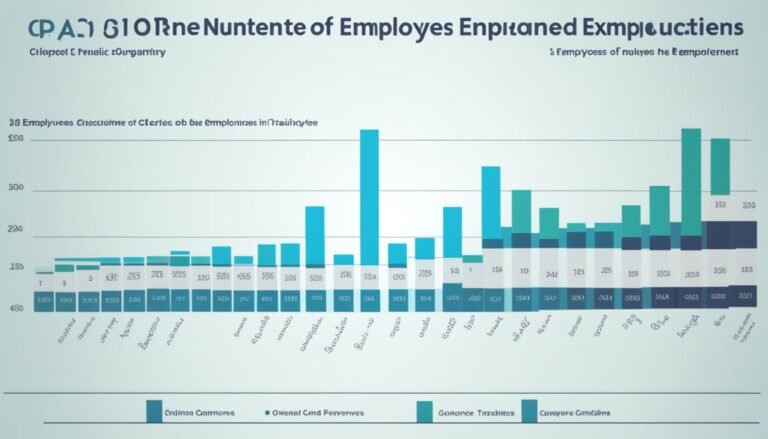A Guide to Human Resources Management Advisory Services
Human Resources Management Advisory Services play a crucial role in helping businesses navigate the complex world of HR. These services provide expert guidance, solutions, and strategies to enhance HR management and optimize processes. Whether it’s HR consulting, HR advisory services, or HR strategy consulting, these experts offer invaluable support to organizations of all sizes.
From talent acquisition consulting to HR process optimization, these advisory services cover a wide range of HR needs. Through comprehensive assessments, HR consultants identify gaps and provide tailored solutions that align with a company’s objectives. With their expertise, they help businesses streamline operations, ensure compliance, and attract and retain top talent.
If you’re considering HR consulting as a career or seeking advisory services for your business, this guide will provide insights and essential information. It explores the role of an HR consultant, considerations for entering this field, tips for success, and the importance of HR consultants in enhancing employee experience.
Key Takeaways
- HR Management Advisory Services offer expert guidance and solutions for HR-related needs.
- HR consultants provide high-level recommendations and strategies to optimize HR processes and ensure compliance.
- Consider your experience and education when entering HR consulting. Decide between being a generalist or specializing in a niche.
- Develop a solid business plan to define your target market, pricing, and client acquisition strategies.
- Networking, referrals, and building relationships are key to success in the HR consulting industry.
What Does an HR Consultant Do?
HR consultants are external professionals hired by companies to address specific HR-related needs. They provide solutions and recommendations to meet management goals and objectives. HR consultants are sought after when a business lacks internal HR support or expertise or when a company wants an outside perspective on a project or challenge. Their objective approach helps them focus on solving problems and making objective decisions without being influenced by internal dynamics.
When it comes to human resources-related need, HR consultants are the go-to experts for high-level solutions. Their in-depth knowledge and experience allow them to analyze complex situations and offer strategic guidance to management teams. Whether it’s designing effective recruitment strategies, optimizing performance management processes, or ensuring compliance with labor laws, HR consultants bring a wealth of expertise to the table.
“HR consultants bring a fresh perspective and objective insights to help organizations overcome HR-related challenges and achieve their goals.”
One of the primary roles of an HR consultant is to assess the current state of HR practices within an organization and identify areas for improvement. This involves conducting thorough audits, analyzing data, and benchmarking against industry best practices. Based on their findings, HR consultants develop tailored strategies and action plans to streamline processes, enhance employee engagement, and drive organizational growth.
Additionally, HR consultants play a crucial role in providing guidance during times of change or crisis. For example, when a company undergoes a merger or acquisition, HR consultants help manage the transition by integrating HR policies, harmonizing employee benefits, and facilitating effective communication. They also assist in implementing change management initiatives, ensuring a smooth transition for both employees and management.
Insert relevant image here:
Benefits of Hiring an HR Consultant
Bringing in an HR consultant offers several advantages for organizations:
- Access to specialized expertise: HR consultants possess deep knowledge and experience in various HR disciplines, allowing them to provide expert guidance in specific areas of need.
- Objective perspective: Being external to the organization, HR consultants have a fresh and unbiased viewpoint, enabling them to identify issues and propose solutions without being influenced by internal dynamics.
- Cost-effective solutions: Hiring an HR consultant on a project basis can be more cost-effective than maintaining a full-time in-house HR team, especially for smaller businesses.
- Efficiency and effectiveness: HR consultants have the skills and resources to streamline HR processes, implement best practices, and improve overall efficiency and effectiveness within the organization.
Case Study: HR Consultant’s Impact on Talent Acquisition
To illustrate the value of HR consultants in solving human resources-related needs, let’s consider a case study on talent acquisition:
| HR Challenge | HR Consultant Solution |
|---|---|
| An organization is struggling to attract top talent and fill critical positions. | The HR consultant conducts a comprehensive assessment of the organization’s recruitment processes, identifies gaps, and develops a targeted recruitment strategy. This includes optimizing job postings, leveraging employer branding, implementing candidate assessment methods, and providing training to hiring managers on effective interviewing techniques. |
| The organization lacks a proactive approach to talent pipelining and succession planning. | The HR consultant designs and implements a talent management program that focuses on identifying high-potential employees, developing their skills, and creating succession plans for key positions. This ensures a continuous pipeline of qualified candidates for future leadership roles. |
| The organization needs to enhance its employer brand to attract top talent. | The HR consultant works with the organization’s marketing team to develop a compelling employer brand that highlights the company’s unique culture, values, and opportunities for growth. They also assist in implementing employer branding initiatives, such as employee testimonials and social media campaigns, to enhance the organization’s reputation as an employer of choice. |
This case study demonstrates how HR consultants can make a significant impact on talent acquisition, helping organizations overcome HR challenges and build a strong workforce that drives business success.
Becoming an HR Consultant: Things to Consider
Before embarking on a career as an HR consultant, it’s crucial to carefully evaluate several key factors. Assessing your experience and education will help determine if you possess the necessary expertise to provide valuable HR consulting services. Many successful HR consultants have accumulated several years of practical experience in the field and hold at least a Bachelor’s degree in a relevant discipline.
Another crucial decision to make is whether you want to pursue a generalist approach or specialize as an HR specialist in a specific niche. Both paths offer unique advantages and challenges. A generalist HR consultant can provide a broad range of HR services to clients, appealing to a wider market. On the other hand, specializing in a particular area, such as talent acquisition or employee benefits, can position you as an expert in that field and attract clients seeking specialized knowledge.
However, irrespective of whether you choose a generalist or specialist route, developing a sound business plan is essential for success as an HR consultant. Your business plan should outline your target market, highlight your unique selling points, and provide insight into your overhead costs, pricing strategies, and client acquisition techniques. Crafting a well-thought-out and comprehensive business plan will guide your decision-making process and set a solid foundation for your consulting practice.
Ultimately, becoming an HR consultant requires careful consideration of one’s experience, education, specialization preferences, and business planning strategies. By thoroughly evaluating these factors, aspiring HR consultants can position themselves for success in the dynamic and rewarding field of HR consulting.
Advice for Aspiring HR Consultants
Aspiring HR consultants can benefit from advice from experienced professionals in the field. Here are some valuable tips to help you navigate the early stages of your consulting career:
- Get Your Financial House in Order: As an independent consultant, it’s crucial to have a solid financial plan in place. Ensure that you understand your expenses, budget for taxes, and establish financial stability to support your business growth.
- Be Prepared for Early Challenges: Building a successful consulting business takes time and effort. Recognize that it might be challenging initially, but stay focused on your goals and be prepared to overcome obstacles along the way.
- Networking is Key: Networking plays a pivotal role in attracting clients and building relationships within the HR consulting industry. Attend industry events, join professional associations, and engage in online communities to expand your network and gain visibility.
- Harness the Power of Referrals: Satisfied clients can be a valuable source of new business opportunities. Deliver exceptional service and encourage your clients to refer you to others in need of HR consulting services. Word-of-mouth referrals can significantly contribute to your client base.
By following these tips and leveraging the expertise of experienced HR consultants, you can position yourself for success in the competitive field of HR consulting.
The Role of HR Consultants in Employee Experience
HR consultants play a crucial role in enhancing the overall employee experience within organizations. They work closely with businesses to create a positive work environment, upgrade workspaces, introduce attractive employee benefits, and invest in training programs.
Addressing Employee Concerns and Creating a Positive Work Environment:
One of the main responsibilities of HR consultants is to address employee concerns and ensure a positive work environment. By conducting employee surveys, focus groups, and individual interviews, they identify pain points and areas for improvement. Based on the feedback received, HR consultants collaborate with management teams to implement changes that enhance employee satisfaction, well-being, and engagement.
Upgrading Workspaces:
HR consultants help businesses create workspaces that foster collaboration, creativity, and productivity. They analyze the existing office layout, furniture, and technology to identify potential improvements. By making strategic adjustments, such as optimizing desk arrangements, enhancing lighting, and incorporating ergonomic furniture, HR consultants contribute to a more comfortable and efficient work environment.
Introducing Employee Benefits:
Employee benefits are a crucial component of the overall employee experience. HR consultants assist businesses in designing and implementing comprehensive benefits packages that align with the company’s values and employees’ needs. These packages often include healthcare plans, retirement benefits, paid time off, flexible work arrangements, and wellness initiatives. By providing attractive employee benefits, businesses can attract top talent and improve employee job satisfaction.
Investing in Training Programs:
Continuous learning and professional development are key factors in employee engagement and retention. HR consultants help businesses invest in training programs that enhance employees’ skills and knowledge. They assess training needs, identify suitable learning opportunities, and coordinate the delivery of training sessions or workshops. By focusing on employee development, HR consultants contribute to a motivated workforce and overall organizational success.
Table: Comparison of Key Elements of Employee Experience
| Key Elements | Importance | Impact |
|---|---|---|
| Work Environment | High | Enhances employee satisfaction and productivity |
| Employee Benefits | High | Attracts and retains top talent |
| Training Programs | Moderate | Improves employee skills and knowledge |
By focusing on these key areas, HR consultants contribute to an enhanced employee experience, resulting in increased job satisfaction, higher levels of engagement, and improved overall organizational performance.
Choosing a Specialty in HR Consulting
When entering the field of HR consulting, professionals face a critical decision: specializing in a specific niche or taking a generalist approach. This choice has a significant impact on attracting clients and establishing a strong client base. Let’s explore the benefits and considerations of each option.
Specialized Niche
Choosing a specialized niche in HR consulting allows professionals to position themselves as experts in a specific area. By focusing on a particular industry or HR function, consultants can target clients who require specialized knowledge and expertise. This niche specialization enables consultants to build credibility and establish themselves as go-to experts in their chosen field.
For example, an HR consultant specializing in talent acquisition consulting can offer unique insights and strategies to help companies streamline their recruitment processes, attract top talent, and build effective talent pipelines.
| Benefits of Specializing in a Niche | Considerations |
|---|---|
|
|
Generalist Approach
On the other hand, taking a generalist approach in HR consulting allows professionals to offer a wide range of HR services and cater to a broader client base. Generalist HR consultants provide comprehensive HR support and solutions across various industries and HR functions. They have the flexibility to adapt to different client needs and provide holistic HR management solutions.
For example, a generalist HR consultant can assist clients with HR strategy consulting, HR process optimization, HR compliance services, and HR outsourcing, among other areas.
| Benefits of a Generalist Approach | Considerations |
|---|---|
|
|
Many HR consultants adopt a blended approach, combining their expertise in a specific niche with general HR support. This approach allows consultants to cater to a wide range of clients while leveraging their specialization to attract clients who need expertise in their niche area.
Ultimately, the choice between specializing in a niche or taking a generalist approach depends on individual preferences, market demand, and long-term career goals. Consultants should carefully assess their strengths, target market, and competitive landscape to make an informed decision that aligns with their expertise and client base goals.
Stay tuned for the next section, where we’ll explore the degrees and education required for HR consultants.
Degrees and Education for HR Consultants
While a specialized degree is not a requirement for HR consulting, having a strong educational background can enhance your credibility and marketability. Many HR consultants have at least a Bachelor’s degree, with some opting for a Master’s degree.
A degree in Human Resources Management or Business Administration can provide the necessary foundation for a career in HR consulting. However, hands-on experience and practical skills are also essential in this field.
Benefits of an HR Degree
An HR degree equips you with the knowledge and skills needed to understand the complexities of human resources management. It covers a wide range of topics including employee recruitment, training and development, compensation and benefits, labor relations, and HR strategy.
Obtaining an HR degree demonstrates your commitment to the field and signals to potential clients and employers that you have a solid foundation of HR knowledge. It can also help you stand out from other HR consultants who may not have a formal education in the field.
An HR degree provides a comprehensive understanding of HR principles and practices, which can be invaluable when providing consulting services to organizations.
Educational Paths for HR Consultants
There are several educational paths you can take to become an HR consultant:
- Bachelor’s Degree in Human Resources Management or Business Administration: This degree provides a broad understanding of HR principles and business management. It covers topics such as employment law, organizational behavior, strategic management, and HR analytics.
- Master’s Degree in Human Resources Management or Business Administration: A Master’s degree delves deeper into HR concepts and strategic thinking. It can help you develop advanced skills in areas such as HR leadership, talent management, and organizational development.
- Certifications and Professional Development: In addition to formal degrees, there are certifications available for HR professionals, such as the Professional in Human Resources (PHR) and Society for Human Resource Management Certified Professional (SHRM-CP) designations. These certifications can demonstrate your expertise and dedication to the HR field.
While degrees and certifications can provide a strong foundation, it’s important to note that practical experience and continuous professional development are equally important in the field of HR consulting. The ability to apply theoretical knowledge to real-world scenarios and stay updated on current HR trends and regulations is critical for success.
| Education Level | Percentage of HR Consultants |
|---|---|
| Bachelor’s Degree | 65% |
| Master’s Degree | 25% |
| No Formal Degree | 10% |
Tips for Offering HR Consulting Services
When it comes to offering HR consulting services, your experience and expertise are crucial. Showcase your past successes and provide references to potential clients to build trust and credibility. It’s essential to develop a plan of action that is tailored to each client’s specific needs and expectations. By conducting thorough market research and staying up-to-date on HR trends, you can provide valuable and relevant services that meet the evolving needs of organizations.
“Success in HR consulting lies in leveraging your experience, references, and staying well-informed about market trends.”
Highlight Your Experience and Expertise
Emphasize your knowledge and proficiency in HR consulting by highlighting your relevant experience and accomplishments. This can include successful projects, specific areas of expertise, and measurable outcomes achieved for previous clients.
Offer References to Potential Clients
Providing references from satisfied clients can significantly enhance your credibility and reputation as an HR consultant. These references can demonstrate your ability to deliver results and establish trust with potential clients.
Develop a Customized Plan of Action
Every client has unique HR needs and expectations. A key aspect of offering HR consulting services is developing a thorough and tailored plan of action for each client. Consider their specific challenges and goals, and outline clear steps and strategies to address their HR concerns.
Stay Informed About HR Trends
HR is a constantly evolving field, with new trends and best practices emerging regularly. As an HR consultant, it’s essential to stay informed about these trends and incorporate them into your services. This enables you to provide valuable insights and recommendations that are relevant to the current HR landscape.
By following these tips, you can position yourself as a trusted and knowledgeable HR consultant. Your experience, references, and well-thought-out plan of action will set you apart from the competition and allow you to provide exceptional HR consulting services.
Business Management for HR Consultants
Running a successful HR consulting practice requires strong business management skills. As an HR consultant, it is crucial to establish the right foundation for your business to thrive. Here are key aspects to consider:
Determine your Target Market:
Identifying your target market is essential for effective business planning and marketing. Determine the industries and types of businesses that align with your expertise and services. This will help you tailor your offerings and messaging to attract the right clients.
Establish a Legal Structure:
Choosing the appropriate legal structure for your HR consulting practice is vital. Consult with a legal professional to understand the different options available, such as sole proprietorship, partnership, or limited liability company (LLC). Selecting the right legal structure ensures compliance with regulations and protects your personal assets.
Develop a Financial Plan:
Creating a comprehensive financial plan is crucial for the success of your HR consulting business. Determine your pricing strategy, overhead costs, and revenue projections. Consider hiring an accountant to ensure accurate financial tracking and reporting.
Manage Administrative Tasks:
As an HR consultant, you will need to handle various administrative tasks to keep your business running smoothly. This includes managing client contracts, invoicing, bookkeeping, and record-keeping. Utilize tools and software that can streamline these processes and improve efficiency.
Consider Insurance and Licensing Requirements:
Protecting your business and clients is essential. Research and obtain the necessary insurance coverage, such as professional liability insurance, to safeguard against potential risks. Additionally, make sure to comply with any licensing or certification requirements in your jurisdiction.
Marketing and Networking:
Effectively marketing your HR consulting services is crucial for attracting clients. Develop a comprehensive marketing plan that includes online and offline strategies. Utilize social media, create a professional website, and attend industry events to network with potential clients and build relationships with fellow HR consultants.
Conclusion
HR consulting is a thriving field that offers HR professionals a rewarding career path in providing guidance and solutions to companies’ HR needs. Success in HR consulting requires careful consideration of essential factors such as experience, education, specialization, and effective business planning. By equipping themselves with the right skills, knowledge, and dedication, HR consultants can make a significant impact on organizations by shaping their HR strategy and contributing to their overall success.
With the ever-evolving nature of the business world, companies increasingly rely on HR consultants to navigate complex HR challenges and optimize their HR services. HR consultants play a vital role in addressing gaps in expertise and offering high-level recommendations and solutions. Their objective approach and outside perspective help companies achieve their management goals and overcome various HR-related obstacles.
As HR consultants embark on their professional journey, it is crucial to continuously expand their knowledge and stay updated on emerging HR trends. By leveraging their experience, education, and specialization, HR consultants can position themselves as trusted partners to their clients, providing tailored HR solutions that address unique needs and drive organizational success. Through effective marketing, networking, and referrals, HR consultants can expand their client base and establish a strong reputation in the industry.







